最新新概念英语第一册第71课Lesson71课文单词知识点
新概念一册-71课
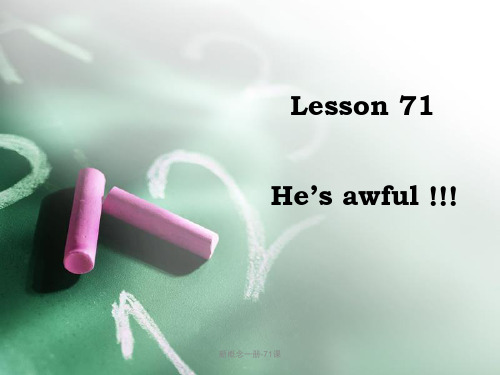
新概念一册-71课
一般过去时的构成: 陈述句: He arrived home at six o’clock yesterday evening.
We were students three years ago. 一般疑问句: Did he telephone you four times? 肯定回答: Yes, he did 否定回答: No, he didn’t=No, he did not. 特殊疑问句:
她昨天给我打了四次电话.
She telephoned me four times yesterday.
新概念一册-71课
新概念一册-71课
新概念一册-71课
新概念一册-71课
新概念一册-71课
新概念一册-71课
★ answer v. 接(电话)
answer the door/doorbell 应声开门 Mary took a few minutes to answer the door.
新概念一册-71课
finally 和last 的区别: Finally “最后”,adv. 常放在句首, e.g. Finally, she is tired but happy. 最后,她很累但是很开心。 Last “最后的”,adj. 后面可以加名词, e.g. He is the last one to leave the classroom. 他是最后一个离开教室的。
新概念一册-71课
last adj. 最后的,前一个
last week/ month/ year at last 最后
e.g. At last, put some sugar in your coffee. 最后在你的咖啡里加一些糖。 have the last word 说的算
新概念第一册第七十一课
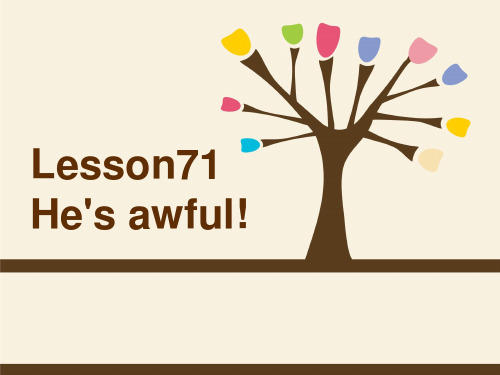
.
本课重点语法 do句型 行为动词变一般过去时的构成
1.一般在动词后直接加-ed) answer-answered wait---waited
.
Retell the text
.
Text analysis & Grammar points
.
语
1、概念:
法
过去时间发生的动作
回
或存在的状态。
顾
(一)
.
一般过去时(I)
语 法 回 顾 (一)
构成1:(过去时间存在的状态)
be 的过去式是was 和were, was 用于第一人称和第三人称单数, were用于其他人称.
.
Lead-in
.
.
New words and expressions
.
['ɔːfʊl] ['telɪfəʊn] [taɪm] ['ɑːnsə]
awful
awful truth
telephone mobile telephone
time answer
many times
answer the telephone
[lɑːst] [fəʊn] [ə'ɡɛn] [seɪ]
last phone again
say
at last phone number never again say what
Listening&Comprehension
新概念英语第一册笔记71-80
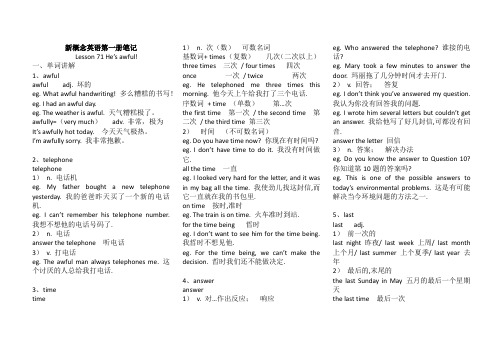
新概念英语第一册笔记Lesson 71 He’s awful!一、单词讲解1、awfulawful adj. 坏的eg.What awful handwriting! 多么糟糕的书写!eg.I had an awful day.eg.The weather is awful. 天气糟糕极了。
awfully=(very much)adv. 非常,极为It’s awfully hot today.今天天气极热。
I’m awfully sorry. 我非常抱歉。
2、telephonetelephone1)n. 电话机eg.My father bought a new telephone yesterday. 我的爸爸昨天买了一个新的电话机.eg.I can’t remember his telephone number. 我想不想他的电话号码了.2)n. 电话answer the telephone 听电话3)v. 打电话eg.The awful man always telephones me. 这个讨厌的人总给我打电话.3、timetime 1)n. 次(数)可数名词基数词+ times (复数)几次(二次以上)three times 三次/ four times 四次once 一次/ twice 两次eg.He telephoned me three times this morning.他今天上午给我打了三个电话.序数词+ time (单数)第…次the first time 第一次/ the second time 第二次/ the third time 第三次2)时间(不可数名词)eg.Do you have time now? 你现在有时间吗?eg.I don’t have time to do it. 我没有时间做它.all the time 一直eg.I looked very hard for the letter, and it wasin my bag all the time. 我使劲儿找这封信,而它一直就在我的书包里.on time 按时,准时eg.The train is on time. 火车准时到站.for the time being 晢时eg.I don’t want to see him for the time being.我晢时不想见他.eg.For the time being, we can’t make thedecision. 晢时我们还不能做决定.4、answeranswer1)v. 对…作出反应;响应eg.Who answered the telephone? 谁接的电话?eg.Mary took a few minutes to answer thedoor. 玛丽拖了几分钟时间才去开门.2)v. 回答;答复eg.I don’t think you’ve answered my question.我认为你没有回答我的问题.eg.I wrote him several letters but couldn’t getan answer. 我给他写了好几封信,可都没有回音.answer the letter 回信3)n. 答案;解决办法eg.Do you know the answer to Question 10?你知道第10题的答案吗?eg.This is one of the possible answers totoday’s environmental problems. 这是有可能解决当今环境问题的方法之一.5、lastlast adj.1)前一次的last night 昨夜/ last week 上周/ last month上个月/ last summer 上个夏季/ last year 去年2)最后的,末尾的the last Sunday in May 五月的最后一个星期天the last time 最后一次6、phonephone n. 电话7、againagain adv. 再一次,又一次eg.Say it again. 再说一次.eg.When can we meet again? 我们何时再见面?eg.Don’t do that again. 下次不可以再这样. eg.This must never happen again. 这样的事情以后不可再度发生.again and again 屡次地,再三地be oneself again (指身体或精神)恢复常态7、saysay v. (强调说话的内容)二、课文讲解What’s Ron Marston like, Pauline?What is sb like? 可用来询问某人的外貌或品行.What’s her father like? 她爸爸是怎样一个人? He’s awful! He telephoned me four times yesterday, and three times the day before yesterday. 他讨厌透了!他昨天给我打了4次电话.前天打了3次. 1)awful 讨厌的I don’t want to speak to this awful man.2)telephone 做动词,打电话telephoned过去式3)four times 4次time在英语中作不可数名词时表示“时间”,作可数名词时表示“次数”, once 一次、twice 两次, 三次或三次以上通常用基数词+ times表示4)yesterday 昨天yesterday morning 昨天上午5)the day before yesterday 前天/ the dayafter tomorrow 后天I washed all my clothes the day beforeyesterday. 我前天把所有的衣服都洗了。
最新新概念英语第一册第71课Lesson71课文单词知识点
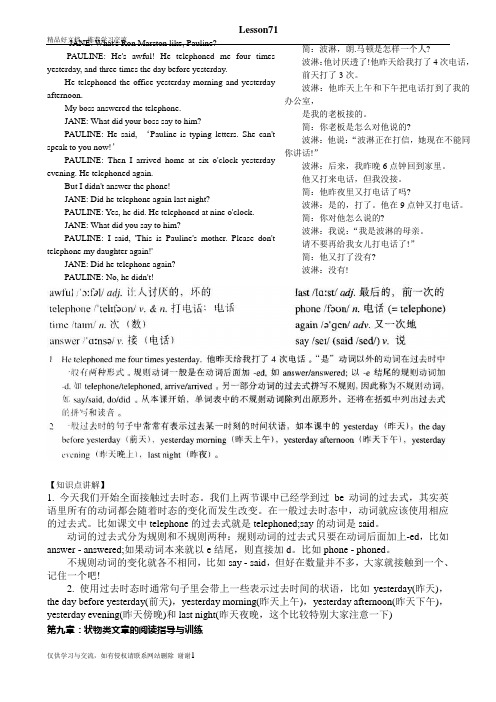
精品好文档,推荐学习交流【知识点讲解】1. 今天我们开始全面接触过去时态。
我们上两节课中已经学到过be 动词的过去式,其实英语里所有的动词都会随着时态的变化而发生改变。
在一般过去时态中,动词就应该使用相应的过去式。
比如课文中telephone 的过去式就是telephoned;say 的动词是said 。
动词的过去式分为规则和不规则两种:规则动词的过去式只要在动词后面加上-ed ,比如answer - answered;如果动词本来就以e 结尾,则直接加d 。
比如phone - phoned 。
不规则动词的变化就各不相同,比如say - said ,但好在数量并不多,大家就接触到一个、记住一个吧!2. 使用过去时态时通常句子里会带上一些表示过去时间的状语,比如yesterday(昨天),the day before yesterday(前天),yesterday morning(昨天上午),yesterday afternoon(昨天下午),yesterday evening(昨天傍晚)和last night(昨天夜晚,这个比较特别大家注意一下)第九章:状物类文章的阅读指导与训练Lesson71JANE: What's Ron Marston like, Pauline?PAULINE: He's awful! He telephoned me four times yesterday, and three times the day before yesterday.He telephoned the office yesterday morning and yesterday afternoon.My boss answered the telephone.JANE: What did your boss say to him?PAULINE: He said, ‘Pauline is typing letters. She can't speak to you now!’PAULINE: Then I arrived home at six o'clock yesterday evening. He telephoned again. But I didn't answer the phone!JANE: Did he telephone again last night?PAULINE: Yes, he did. He telephoned at nine o'clock. JANE: What did you say to him?PAULINE: I said, 'This is Pauline's mother. Please don't telephone my daughter again!'JANE: Did he telephone again? PAULINE: No, he didn't!简:波淋,朗.马顿是怎样一个人?波淋:他讨厌透了!他昨天给我打了4次电话, 前天打了3次。
新概念英语第1册第71-72课重点语法
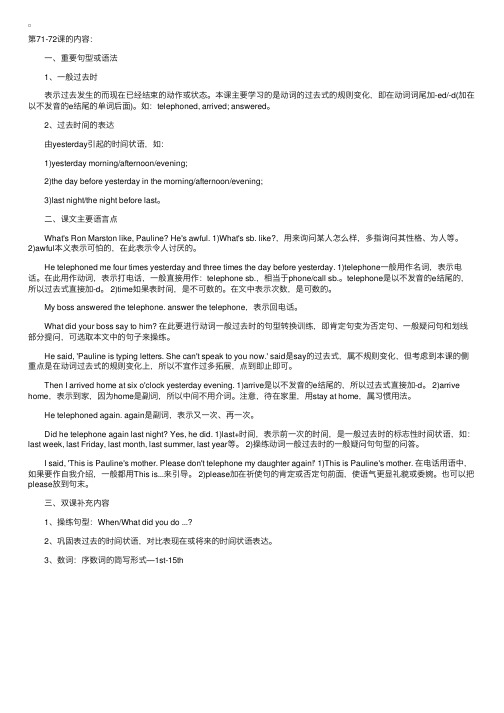
第71-72课的内容: ⼀、重要句型或语法 1、⼀般过去时 表⽰过去发⽣的⽽现在已经结束的动作或状态。
本课主要学习的是动词的过去式的规则变化,即在动词词尾加-ed/-d(加在以不发⾳的e结尾的单词后⾯)。
如:telephoned, arrived; answered。
2、过去时间的表达 由yesterday引起的时间状语,如: 1)yesterday morning/afternoon/evening; 2)the day before yesterday in the morning/afternoon/evening; 3)last night/the night before last。
⼆、课⽂主要语⾔点 What's Ron Marston like, Pauline? He's awful. 1)What's sb. like?,⽤来询问某⼈怎么样,多指询问其性格、为⼈等。
2)awful本义表⽰可怕的,在此表⽰令⼈讨厌的。
He telephoned me four times yesterday and three times the day before yesterday. 1)telephone⼀般⽤作名词,表⽰电话。
在此⽤作动词,表⽰打电话,⼀般直接⽤作:telephone sb.,相当于phone/call sb.。
telephone是以不发⾳的e结尾的,所以过去式直接加-d。
2)time如果表时间,是不可数的。
在⽂中表⽰次数,是可数的。
My boss answered the telephone. answer the telephone,表⽰回电话。
What did your boss say to him? 在此要进⾏动词⼀般过去时的句型转换训练,即肯定句变为否定句、⼀般疑问句和划线部分提问,可选取本⽂中的句⼦来操练。
He said, 'Pauline is typing letters. She can't speak to you now.' said是say的过去式,属不规则变化,但考虑到本课的侧重点是在动词过去式的规则变化上,所以不宜作过多拓展,点到即⽌即可。
新概念1第71课

构成2:行为动词,表示过去某一时间发生的动作
行为动词变一般过去时的构成
1.一般在动词后直接加-ed
answer-answered wait---waited
2.以不发音的e结尾的动词直接加_dtelephone---telephoned arrive---arrived
3.以辅音加y结尾的,把y改为i,再加ed empty--emptied
2.对……作出反应;响应
answer the phone/telephone
接电话
answer the door/doorbell
应声开门
Mary took a few minutes to answer the door. 玛丽拖了几分钟时间才去开门。
n. 答案 ,办法 Do you know the answer to Question 10? 你知道问题10的答案吗? This is the only answer to this problem. 这是解决这个问题的唯一办法。
2.speak to sb. 与某人说话 May I speak to Pauline, please? I'd like to speak to Pauline, please. 在电话中回答:This is….
一般过去时 II
概念:过去时间发生的动作或存在的状态。
构成1:be动词,表示过去时间存在的状态 be 的过去式是was 和were,was 用于第一人称和第三人称单数,were用于其他人称, 如:We were there at four o'clock.(P140) Were you at the butcher's?(P133) I was at home on Saturday.(P136)
新概念英语第一册笔记71-80课
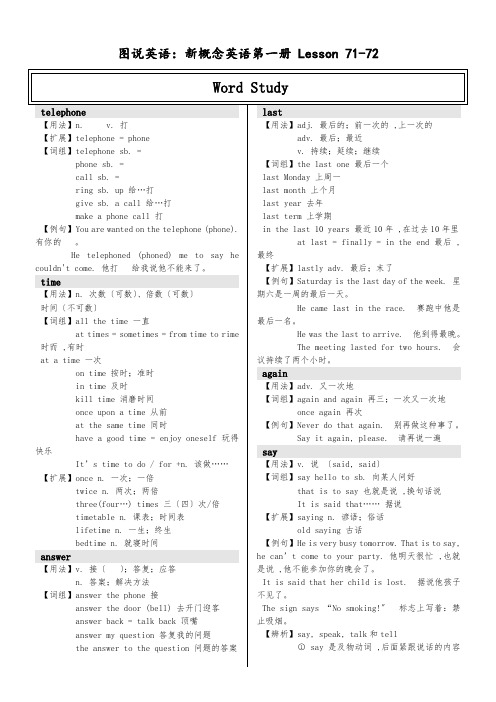
图说英语:新概念英语第一册Lesson71-72【译文】波琳,朗·马斯顿是怎样一个人?【用法】What’s sb.like?表示“……怎么样?〞可以用来询问某人的品行,如问外貌,可用句型What does sb.look like?“……长什么样子?〞He’s awful!He telephoned me four times yesterday and three timesthe day before yesterday.【译文】他讨厌透了!他昨天给我打了4次,前天打了3次。
【用法】○1awful 表示“很坏的,极坏的〞,例如:The weather last summer was awful.刚过完的夏天天气很差。
在词尾加上副词词缀-ly,awfully 表示“很坏地〞。
○2telephone 是规那么动词,变过去式直接加d。
○3four times,three times 都是表达次数的,once 一次,twice 两次,三次及其以上都由“基数词+times〞构成。
○4the day before yesterday 意为“前天〞。
Then I arrived home at six o’clock yesterday evening.He telephoned again.【译文】后来,我昨晚6点钟回到家。
他又打来。
【用法】○1arrived home 中home 地点副词,所以省略前面的介词at。
○2at six o’clock yesterday evening 昨晚六点钟,英语中时间顺序应遵循由小到大的顺序。
○3again 副词在本句作状语,修饰动词telephoned ,表示“又一次〞。
I said,‘This is Pauline’s mother.Please don’t telephone my daughter again!’【译文】我说:“我是波琳的母亲。
请不要再给我女儿打了!〞【用法】○1英语中,引用别人的话时,在say 后面加逗号和引号。
新概念英语单词第1册Lesson71:He'sawful!
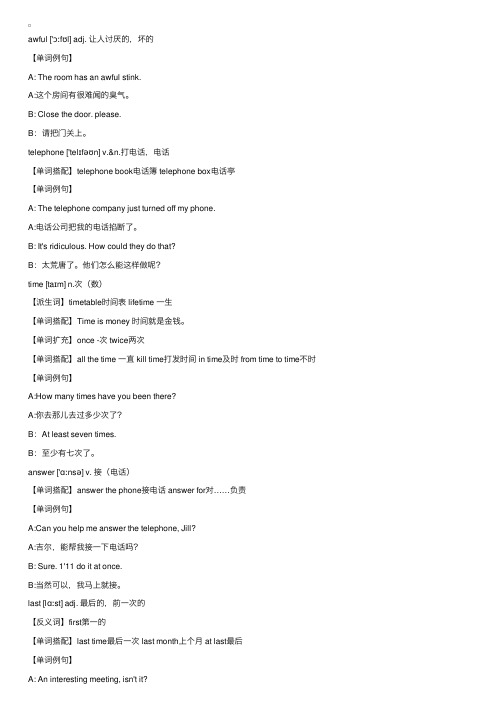
awful ['ɔːfʊl] adj. 让⼈讨厌的,坏的【单词例句】A: The room has an awful stink.A:这个房间有很难闻的臭⽓。
B: Close the door. please.B:请把门关上。
telephone ['telɪfəʊn] v.&n.打电话,电话【单词搭配】telephone book电话簿 telephone box电话亭【单词例句】A: The telephone company just turned off my phone.A:电话公司把我的电话掐断了。
B: It's ridiculous. How could they do that?B:太荒唐了。
他们怎么能这样做呢?time [taɪm] n.次(数)【派⽣词】timetable时间表 lifetime ⼀⽣【单词搭配】Time is money 时间就是⾦钱。
【单词扩充】once -次 twice两次【单词搭配】all the time ⼀直 kill time打发时间 in time及时 from time to time不时【单词例句】A:How many times have you been there?A:你去那⼉去过多少次了?B:At least seven times.B:⾄少有七次了。
answer ['ɑːnsə] v. 接(电话)【单词搭配】answer the phone接电话 answer for对……负责【单词例句】A:Can you help me answer the telephone, Jill?A:吉尔,能帮我接⼀下电话吗?B: Sure. 1'11 do it at once.B:当然可以,我马上就接。
last [lɑːst] adj. 最后的,前⼀次的【反义词】first第⼀的【单词搭配】last time最后⼀次 last month上个⽉ at last最后【单词例句】A: An interesting meeting, isn't it?A:很有意思的会议,不是吗?B: Yes.I thought the last speaker was especially good.B:是的,我认为最后⼀个尤其特别好。
- 1、下载文档前请自行甄别文档内容的完整性,平台不提供额外的编辑、内容补充、找答案等附加服务。
- 2、"仅部分预览"的文档,不可在线预览部分如存在完整性等问题,可反馈申请退款(可完整预览的文档不适用该条件!)。
- 3、如文档侵犯您的权益,请联系客服反馈,我们会尽快为您处理(人工客服工作时间:9:00-18:30)。
精品好文档,推荐学习交流
【知识点讲解】
1. 今天我们开始全面接触过去时态。
我们上两节课中已经学到过be 动词的过去式,其实英语里所有的动词都会随着时态的变化而发生改变。
在一般过去时态中,动词就应该使用相应的过去式。
比如课文中telephone 的过去式就是telephoned;say 的动词是said 。
动词的过去式分为规则和不规则两种:规则动词的过去式只要在动词后面加上-ed ,比如answer - answered;如果动词本来就以e 结尾,则直接加d 。
比如phone - phoned 。
不规则动词的变化就各不相同,比如say - said ,但好在数量并不多,大家就接触到一个、记住一个吧!
2. 使用过去时态时通常句子里会带上一些表示过去时间的状语,比如yesterday(昨天),the day before yesterday(前天),yesterday morning(昨天上午),yesterday afternoon(昨天下午),yesterday evening(昨天傍晚)和last night(昨天夜晚,这个比较特别大家注意一下)
第九章:状物类文章的阅读指导与训练
Lesson71
JANE: What's Ron Marston like, Pauline?
PAULINE: He's awful! He telephoned me four times yesterday, and three times the day before yesterday.
He telephoned the office yesterday morning and yesterday afternoon.
My boss answered the telephone.
JANE: What did your boss say to him?
PAULINE: He said, ‘Pauline is typing letters. She can't speak to you now!’
PAULINE: Then I arrived home at six o'clock yesterday evening. He telephoned again. But I didn't answer the phone!
JANE: Did he telephone again last night?
PAULINE: Yes, he did. He telephoned at nine o'clock. JANE: What did you say to him?
PAULINE: I said, 'This is Pauline's mother. Please don't telephone my daughter again!'
JANE: Did he telephone again? PAULINE: No, he didn't!
简:波淋,朗.马顿是怎样一个人?
波淋:他讨厌透了!他昨天给我打了4次电话, 前天打了3次。
波淋:他昨天上午和下午把电话打到了我的办公室,
是我的老板接的。
简:你老板是怎么对他说的? 波淋:他说:“波淋正在打信,她现在不能同你讲话!”
波淋:后来,我昨晚6点钟回到家里。
他又打来电话,但我没接。
简:他昨夜里又打电话了吗?
波淋:是的,打了。
他在9点钟又打电话。
简:你对他怎么说的?
波淋:我说:“我是波淋的母亲。
请不要再给我女儿打电话了!” 简:他又打了没有? 波淋:没有!
精品好文档,推荐学习交流
一、基础知识
状物,就是把事物的形状、颜色、性能等特点用生动形象的语言描述出来。
一般分为:“状静物文”如《赵州桥》、“状动物文”如《燕子》、“状植物文”如《荷花》。
1、弄清描写顺序,把握整体印象
“状物”不但要言之有物,还要言之有序。
描写顺序,可以从概括到具体,可以从整体到部分,可以按总—分—总的顺序。
静物的描写顺序:样子、结构、用途
动物的描写顺序:外形、动态、习性
植物的描写顺序:春夏秋冬的四季变化;根、茎、叶、花、果
2、抓住实物特点,理解写作目的
状物的文章总是通过对个体形象的描述,突出事物的特点,表达思想感情,包括:托物寄情、托物言情、托物言志。
在阅读文章时,要通过表面的描写去分析作者的写作意图,体味作者寓什么理,寄什么情,言什么志。
3、分析文章结构,理清文章层次
在文章结构方面,此类文章通常采用按照事物不同方面的特点来安排材料的方法。
经常采用的是总—分、分—总、总—分—总的结构方式。
总之,我们在阅读的时候,要根据事物的特点张开合理的联想,体会作者借描写这个事物所要表达的思想感情。
二、热点题型
1、把握状物类文章中心,方法有:
①通过分析文章中的有关画面,结合作者的内心感受,把握作者的思想感情。
②分析文章中关键性句段,特别是首尾段,从中理解作者的写作意图。
